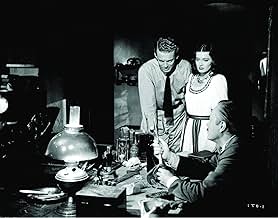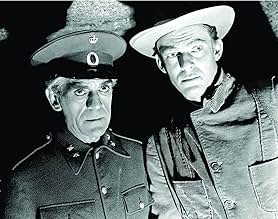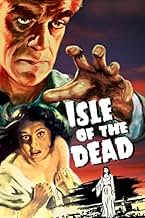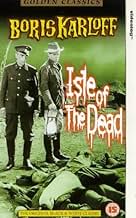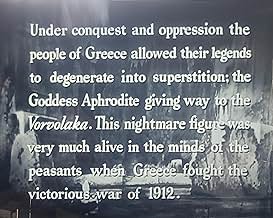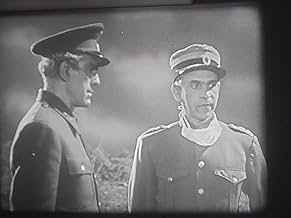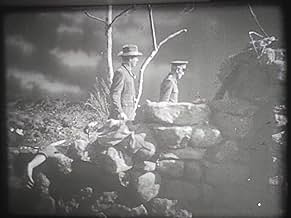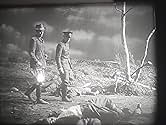IMDb RATING
6.5/10
5.6K
YOUR RATING
A Greek general takes leave from the 1912 Balkan War to visit a small island in Greece, where his wife is buried. A plague soon breaks out and he is forced to stay when quarantine is declare... Read allA Greek general takes leave from the 1912 Balkan War to visit a small island in Greece, where his wife is buried. A plague soon breaks out and he is forced to stay when quarantine is declared.A Greek general takes leave from the 1912 Balkan War to visit a small island in Greece, where his wife is buried. A plague soon breaks out and he is forced to stay when quarantine is declared.
- Awards
- 2 nominations total
Jason Robards Sr.
- Albrecht
- (as Jason Robards)
Ernst Deutsch
- Dr. Drossos
- (as Ernst Dorian)
Sherry Hall
- Col. Kobestes
- (uncredited)
Erick Hanson
- Officer
- (uncredited)
Rose Hobart
- Mrs. Mary St. Aubyn (in long shot)
- (uncredited)
Skelton Knaggs
- Andrew Robbins
- (uncredited)
- Director
- Writers
- All cast & crew
- Production, box office & more at IMDbPro
Featured reviews
In 1912, a stern old Greek general finds himself trapped on the ISLE OF THE DEAD after an outbreak of the dreaded plague.
When the front office at RKO Pictures informed producer Val Lewton that Boris Karloff had been procured to appear in his next suspense film, he wasn't entirely pleased. Karloff was famous for his portrayal of horrific monsters & mummies, sensationalist creations not at all in tune with the psychological thrillers for which Lewton was noted -- with very low budgets, he was able to fashion fascinating films in which the atmosphere was every bit as important as the plot.
Luckily, Karloff turned out to be an inspired choice. Determined to show that he was a skilled actor (actually, he was a very fine & talented performer) he was completely in sync with what Lewton envisaged, giving a nuanced portrayal of an essentially decent man who finds himself slowly driven to a sort of despair by the forces around him. He becomes the heart of a film which wisely saves its shocks for the last few minutes, having built up to the eerie climax slowly & inexorably.
Lewton was very pleased with Karloff's work and arranged two more collaborations. With only two weeks left in filming ISLE OF THE DEAD, Karloff had to be hospitalized for serious back problems. On his release from hospital, he found Lewton was all prepared to film THE BODY SNATCHER (1945). Karloff gave another wonderful performance, before finally finishing ISLE OF THE DEAD. The following year Karloff starred in Lewton's BEDLAM (1946), completing the trio of very tidy thrillers.
Karloff's co-stars give him good support, especially Ernst Deutsch as a military doctor; Alan Napier & Katherine Emery as a British consul and his invalid wife; Helen Thimig as a superstitious Greek peasant; and little Skelton Knaggs, who in a tiny scene with only a few words is able to make his Cockney tinker character come alive.
Ellen Drew & Marc Cramer handle the romance, which fortunately does not intrude too much on the story.
The viewer, in the course of watching ISLE OF THE DEAD, will discover much about the medical state of catatonia, as well as the monstrous vorvolaka, part vampire - part werewolf, which haunts Greek nightmares.
Lewton based his ideas for this film on a painting he had seen as a boy in Russia, Arnold Böcklin's darkly allegorical Island of the Dead (1880), which is shown behind the opening credits of the film. This somewhat sinister painting was also the inspiration for Sergey Rachmaninoff's celebrated symphonic poem, The Isle of the Dead' (1909).
Incidentally, the conflict which is the background to the film was the Balkan War of 1912, in which the Balkan League (Greece, Serbia, Bulgaria & Montenegro) attacked the Ottoman Empire and destroyed most of its hegemony on the European continent. Begun in October and ended in December, it was short & bloody. However, troubles in Constantinople started hostilities up again in January of 1913. It finally ended in May, with the Turks once more decisively defeated. Although the Empire was left very much weakened, the War solved very little else. In June, the victorious parties began fighting amongst themselves, with Greece & Serbia trouncing Bulgaria by August. Greece ended the two short Wars with Crete and parts of Macedonia & Epirus added to her territories and the new state of Albania was carved out of old Ottoman lands. But ancient animosities were aroused and the entire Peninsula lay waiting for the next international incident, which obligingly took place 10 months later at the Bosnian capital of Sarajevo.
When the front office at RKO Pictures informed producer Val Lewton that Boris Karloff had been procured to appear in his next suspense film, he wasn't entirely pleased. Karloff was famous for his portrayal of horrific monsters & mummies, sensationalist creations not at all in tune with the psychological thrillers for which Lewton was noted -- with very low budgets, he was able to fashion fascinating films in which the atmosphere was every bit as important as the plot.
Luckily, Karloff turned out to be an inspired choice. Determined to show that he was a skilled actor (actually, he was a very fine & talented performer) he was completely in sync with what Lewton envisaged, giving a nuanced portrayal of an essentially decent man who finds himself slowly driven to a sort of despair by the forces around him. He becomes the heart of a film which wisely saves its shocks for the last few minutes, having built up to the eerie climax slowly & inexorably.
Lewton was very pleased with Karloff's work and arranged two more collaborations. With only two weeks left in filming ISLE OF THE DEAD, Karloff had to be hospitalized for serious back problems. On his release from hospital, he found Lewton was all prepared to film THE BODY SNATCHER (1945). Karloff gave another wonderful performance, before finally finishing ISLE OF THE DEAD. The following year Karloff starred in Lewton's BEDLAM (1946), completing the trio of very tidy thrillers.
Karloff's co-stars give him good support, especially Ernst Deutsch as a military doctor; Alan Napier & Katherine Emery as a British consul and his invalid wife; Helen Thimig as a superstitious Greek peasant; and little Skelton Knaggs, who in a tiny scene with only a few words is able to make his Cockney tinker character come alive.
Ellen Drew & Marc Cramer handle the romance, which fortunately does not intrude too much on the story.
The viewer, in the course of watching ISLE OF THE DEAD, will discover much about the medical state of catatonia, as well as the monstrous vorvolaka, part vampire - part werewolf, which haunts Greek nightmares.
Lewton based his ideas for this film on a painting he had seen as a boy in Russia, Arnold Böcklin's darkly allegorical Island of the Dead (1880), which is shown behind the opening credits of the film. This somewhat sinister painting was also the inspiration for Sergey Rachmaninoff's celebrated symphonic poem, The Isle of the Dead' (1909).
Incidentally, the conflict which is the background to the film was the Balkan War of 1912, in which the Balkan League (Greece, Serbia, Bulgaria & Montenegro) attacked the Ottoman Empire and destroyed most of its hegemony on the European continent. Begun in October and ended in December, it was short & bloody. However, troubles in Constantinople started hostilities up again in January of 1913. It finally ended in May, with the Turks once more decisively defeated. Although the Empire was left very much weakened, the War solved very little else. In June, the victorious parties began fighting amongst themselves, with Greece & Serbia trouncing Bulgaria by August. Greece ended the two short Wars with Crete and parts of Macedonia & Epirus added to her territories and the new state of Albania was carved out of old Ottoman lands. But ancient animosities were aroused and the entire Peninsula lay waiting for the next international incident, which obligingly took place 10 months later at the Bosnian capital of Sarajevo.
I'm still not quite sure what I saw in Isle of the Dead. I do know it succeeded in giving me the willies.
Several people gather on Greek Island during the Balkan Wars when a type of plague strikes and folks die one by one. One old peasant woman, Helene Thimig suspects young and pretty Ellen Drew of being a monster called a Vorvola which was part of the old Greek religion of Zeus and the rest of the folks from Olympus. The problem is that she gets old Greek general Boris Karloff, a brooding and suspicious man to start with, believing it as well.
Imagine Agatha Christie's And Then There Were None laced with the atmosphere of a horror film and you've got Isle of the Dead. At the end of the film you're not even sure what's happened, but the mood created in you by producer Val Lewton will linger on.
I'm not sure what a guy like Val Lewton would have done with a big budget in a studio like MGM or Paramount. Those recycled RKO sets with the proper sinister lighting were a signature with him.
So was there a Vorvola? Watch and judge for yourself.
Several people gather on Greek Island during the Balkan Wars when a type of plague strikes and folks die one by one. One old peasant woman, Helene Thimig suspects young and pretty Ellen Drew of being a monster called a Vorvola which was part of the old Greek religion of Zeus and the rest of the folks from Olympus. The problem is that she gets old Greek general Boris Karloff, a brooding and suspicious man to start with, believing it as well.
Imagine Agatha Christie's And Then There Were None laced with the atmosphere of a horror film and you've got Isle of the Dead. At the end of the film you're not even sure what's happened, but the mood created in you by producer Val Lewton will linger on.
I'm not sure what a guy like Val Lewton would have done with a big budget in a studio like MGM or Paramount. Those recycled RKO sets with the proper sinister lighting were a signature with him.
So was there a Vorvola? Watch and judge for yourself.
In 1912, during the First Balkan War, the cruel, heartless and superstitious Greek General Nikolas Pherides (Boris Karloff) rows a boat to a small island with the American Boston Star journalist Oliver Davis (Marc Cramer) to visit his wife's grave. They find it destroyed and the body missing and they overhear a woman singing. Soon they learn that the archaeologist Albrecht (Jason Robards Sr.) lives in the island with his servant Madame Kyra (Helene Thimig) and is welcoming his friends St. Aubyn (Alan Napier), his wife Mrs. Mary St. Aubyn (Katherine Emery) and their servant Thea (Ellen Drew); and Andrew Robbins (Skelton Knaggs).
Albrecht invites General Pherides and Oliver to spend the night with them but during the night, Andrew dies. General Pherides summons Dr. Drossos (Ernst Dorian) that informs that Andrew died of pestilence and advises that they have to stay quarantined in the spot for the plague until the warm and dry Sirocco wind blows in the island. Otherwise it might happen an outbreak in the continent. The superstitious Kyra convinces General Pherides that Thea is the evil demon Vorvolaka and Mrs. St. Aubyn and Oliver need to protect her against the ignorance.
"Isle of the Dead" is a dramatic horror movie about superstition and death. The claustrophobic story is very well developed, with a beautiful black and white cinematography, excellent camera work and great performance of Boris Karloff and Ellen Drew. The climax with the reappearance of the deranged Mrs. St. Aubyn is creepy and ambiguous. My vote is seven.
Title (Brazil): "A Ilha dos Mortos" ("The Isle of the Dead")
Albrecht invites General Pherides and Oliver to spend the night with them but during the night, Andrew dies. General Pherides summons Dr. Drossos (Ernst Dorian) that informs that Andrew died of pestilence and advises that they have to stay quarantined in the spot for the plague until the warm and dry Sirocco wind blows in the island. Otherwise it might happen an outbreak in the continent. The superstitious Kyra convinces General Pherides that Thea is the evil demon Vorvolaka and Mrs. St. Aubyn and Oliver need to protect her against the ignorance.
"Isle of the Dead" is a dramatic horror movie about superstition and death. The claustrophobic story is very well developed, with a beautiful black and white cinematography, excellent camera work and great performance of Boris Karloff and Ellen Drew. The climax with the reappearance of the deranged Mrs. St. Aubyn is creepy and ambiguous. My vote is seven.
Title (Brazil): "A Ilha dos Mortos" ("The Isle of the Dead")
Wonderfully atmospheric film with a unique sense of place and well-drawn characters. Karloff's performance here is excellent, yet very different from his work in other films. You may be disappointed if you go in expecting something like his horror classics for Universal. This one is suggestive rather than shocking, and I'd recommend it to anyone who likes the subtle horrors of Cat People, The Innocents, or even Rosemary's Baby. Because of its literate script and interesting character development, Isle of the Dead may also appeal to others who don't usually like horror.
Boris Karloff heads a group of internationals quarantined on a small Greek island during the Balkan War of 1912. A plague has visited the island and forces a group of unlike people to stay together in order to not spread the plague. Karloff plays a misunderstood, rather austere Greek general known for his coldness. Others on the island include Jason Robards Sr. as a man who prays to the Greek gods of old, beautiful Ellen Drew as a serving woman thought to be a "Greek vampire" by an older superstitious Greek woman, Alan Napier and Katherine Emery as an aristocratic English couple, and several others. Karloff is wonderful in a role that has nothing to do with anything he had ever or would ever play. His face is a character of its own. The rest of the cast is very good too(Robards is a bit annoying, however). Drew is lovely. The real star of the film is the atmosphere created in the film. Director Mark Robson, under the production savvy of Val Lewton, creates a film reeking with eerie settings, a feeling of isolation and all-pervading doom, and a somewhat slow-pace that ordinarily might seem sluggish but under Robson's direction adds only to the mood.
Did you know
- TriviaRose Hobart was cast in the film, but Boris Karloff became ill and the production had to be shut down until he recovered. By the time he returned, she was working on another film and was replaced. However, Hobart said in a 1984 interview that she can still recognize herself in long shots.
- GoofsAlbrecht refers to Hermes as the god of medicine. In Greek mythology, Asclepius was the god of medicine. In terms of medical support, Hermes' assistance was sought by runners or any athletes with injuries.
- Crazy creditsIntro: "Under conquest and oppression the people of Greece allowed their legends to degenerate into superstition; the Goddess Aphrodite giving way to the Vorvolaka. This nightmare figure was very much alive in the minds of the peasants when Greece fought the victorious war of 1912."
Details
Box office
- Budget
- $246,000 (estimated)
- Runtime1 hour 11 minutes
- Color
- Aspect ratio
- 1.37 : 1
Contribute to this page
Suggest an edit or add missing content



